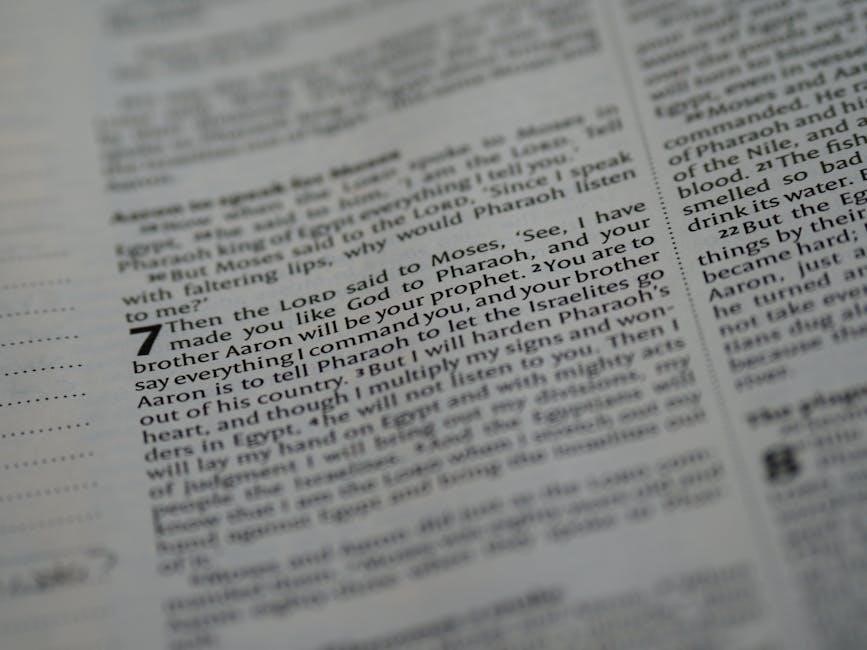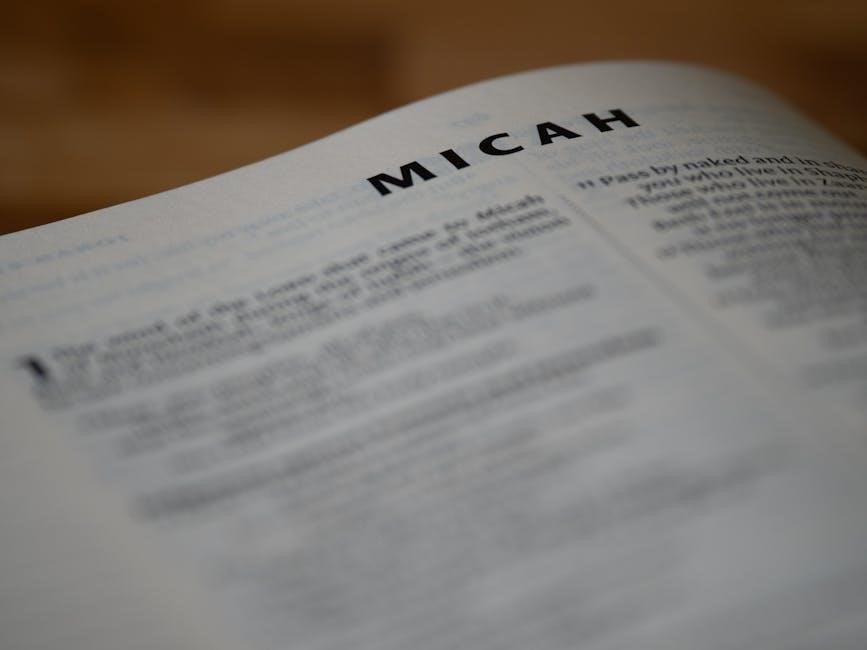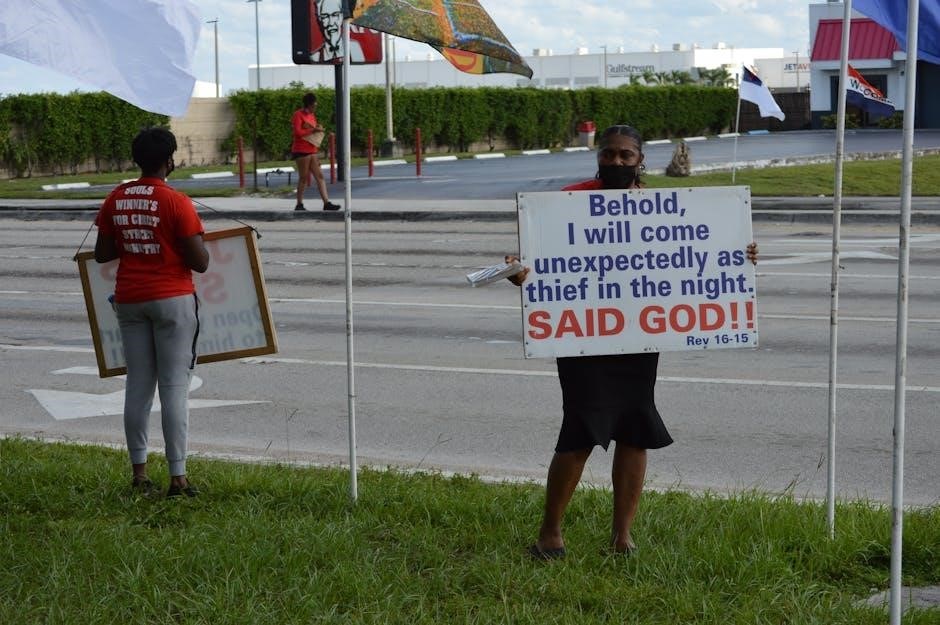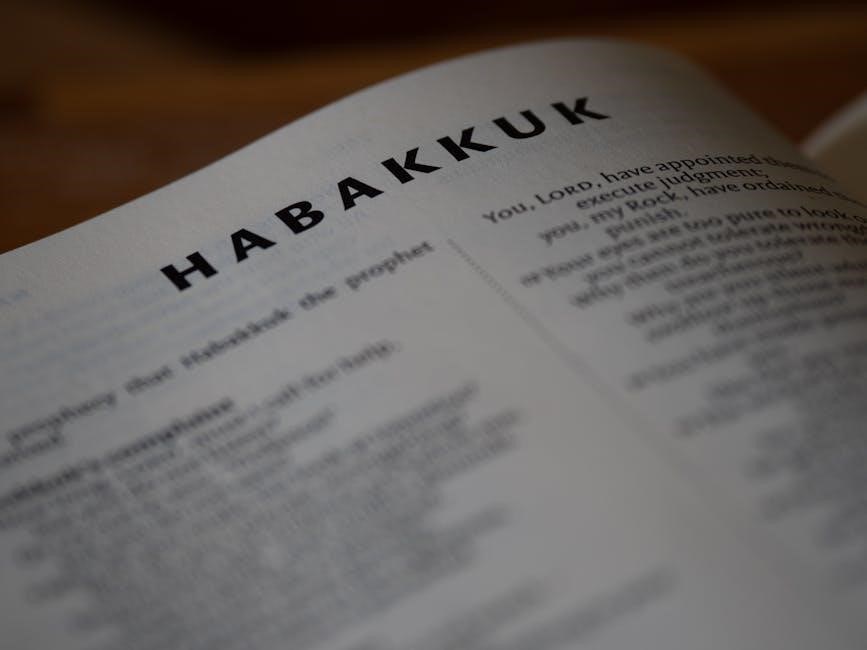Biblical prophets, messengers of God, played a pivotal role in divine communication, guiding Israel through history, morality, and spiritual renewal. Their teachings and visions remain central to biblical theology.
Overview of Prophets in the Bible
The prophets in the Bible served as messengers of God, delivering divine messages to guide Israel through history, morality, and spiritual renewal. They included both Major Prophets, such as Isaiah, Jeremiah, Ezekiel, and Daniel, and Minor Prophets like Hosea, Joel, and Amos. Their prophecies often emphasized repentance, divine judgment, and hope for redemption. Prophets played a crucial role during the United Kingdom, Divided Kingdom, and post-exilic periods, addressing both spiritual and political issues; Their teachings remain central to biblical theology, influencing Jewish and Christian traditions alike.

Classification of Prophets
Prophets in the Bible are categorized into Major and Minor Prophets. Major Prophets include Isaiah, Jeremiah, Ezekiel, and Daniel, while Minor Prophets include Hosea, Joel, Amos, and others.
Major Prophets
The Major Prophets, including Isaiah, Jeremiah, Ezekiel, and Daniel, are distinguished by the length and depth of their writings. Isaiah, known for his messianic prophecies, Jeremiah for his lamentations during Jerusalem’s fall, Ezekiel for his visions, and Daniel for apocalyptic imagery. Their works are extensive, addressing themes like judgment, redemption, and divine sovereignty. These prophets played crucial roles in shaping Israel’s spiritual and historical landscape, offering profound insights into God’s plan and humanity’s response. Their teachings remain central to biblical theology and continue to inspire reflection and faith.
Minor Prophets
The Minor Prophets, despite their name, hold significant importance in the Bible. Comprising twelve books, they include Hosea, Joel, Amos, Obadiah, Jonah, Micah, Nahum, Habakkuk, Zephaniah, Haggai, Zechariah, and Malachi. Each prophet addressed specific issues, such as social injustice, idolatry, and the need for repentance. Their collective message emphasizes God’s justice, mercy, and ultimate plan for redemption. Though their writings are shorter, their impact on biblical theology is profound, offering insights into God’s relationship with humanity and the call to faithfulness and obedience.

Historical Context of Prophets
Biblical prophets emerged during ancient Israel’s history, from the United Kingdom (1051 BC) to the Divided Kingdom, addressing idolatry, moral decay, and political turmoil through divine messages.
Timeline of Prophets in the Bible
The biblical prophets spanned multiple eras, beginning with the United Kingdom (1051–931 BC) under Saul, David, and Solomon. The Divided Kingdom (931–722 BC) saw prophets like Elijah, Elisha, and Amos addressing Israel’s spiritual decline. The exilic period (722–586 BC) included Jeremiah and Ezekiel, who prophesied during and after the fall of Jerusalem; Post-exilic prophets like Haggai and Zechariah (520–518 BC) focused on rebuilding and restoration. This timeline highlights key figures and their roles in Israel’s history, emphasizing divine judgment, redemption, and hope.
The prophets’ ministries were deeply intertwined with political and social events, making their messages relevant to both their contemporaries and future generations. Their teachings remain central to biblical theology and continue to inspire reflection and faith today.
Prophets of the United Kingdom
During the United Kingdom (1051–931 BC), prophets like Samuel, Nathan, and Gad played crucial roles in shaping Israel’s spiritual and political landscape. Samuel, the last judge, anointed Saul and David, establishing the monarchy. Nathan confronted David over his sins, emphasizing divine accountability. Gad and Nathan also served as royal advisors, blending spiritual guidance with political counsel. These prophets laid the groundwork for Israel’s relationship with God, emphasizing obedience and faithfulness. Their ministries marked a transitional era, blending the judges’ period with the monarchy’s rise.
Their contributions underscored the prophet’s role as both divine messengers and national leaders, guiding Israel through its formative years.
Prophets of the Divided Kingdom
During the Divided Kingdom (931–722 BC), prophets like Elijah, Elisha, Amos, and Hosea emerged, addressing both Israel and Judah. Elijah and Elisha focused on Israel, confronting idolatry and upholding God’s sovereignty. Amos and Hosea denounced social injustice and spiritual apostasy, calling for repentance. In Judah, prophets like Isaiah and Micah warned against corruption and foreign alliances, emphasizing faith in Yahweh. These prophets served as moral and spiritual guides, urging both kingdoms to return to covenant faithfulness. Their messages highlighted God’s judgment and mercy, offering hope for restoration.
Their ministries underscored the divine call to righteousness amid political turmoil.

Notable Prophets and Their Messages
Major Prophets like Isaiah, Jeremiah, Ezekiel, and Daniel delivered profound messages of hope, judgment, and redemption. Minor Prophets, including Hosea, Joel, and Amos, emphasized repentance and justice, calling God’s people back to faithfulness and righteousness.
Isaiah: Prophecies and Significance
Isaiah, a prominent prophet of the Old Testament, is renowned for his profound prophecies and spiritual insights. Active during the 8th century BC, he ministered to the Kingdom of Judah, calling the people to repentance and faithfulness. His prophecies are filled with visions of redemption, emphasizing God’s sovereignty and mercy. Isaiah’s writings include iconic messianic prophecies, such as the virgin birth of Jesus Christ, which have deeply influenced Christian theology. His words continue to inspire hope and provide comfort, making him one of the most revered prophets in biblical history.
Jeremiah: The Weeping Prophet
Jeremiah, active during the 7th to 6th centuries BC, is known as the “Weeping Prophet” due to his deep emotional connection to God’s message. He prophesied during a tumultuous period, witnessing the fall of Jerusalem and the destruction of the Temple. His prophecies emphasized judgment for sin, calls to repentance, and the hope of future restoration. Jeremiah’s ministry included symbolic actions, such as buying a potter’s field, to illustrate God’s message. His prophecies, often delivered with tears, underscored the consequences of disobedience while offering a vision of redemption and renewal for God’s people.
Ezekiel: Visions and symbolic Actions
Ezekiel: Visions and Symbolic Actions
Ezekiel, a prophet during the Babylonian exile, received vivid visions and performed symbolic actions to convey God’s messages. His prophetic ministry began with a divine call in a whirlwind, where he saw God’s glory and was commissioned to speak to Israel. Ezekiel’s visions, such as the valley of dry bones and the wheel within a wheel, emphasized judgment, restoration, and the future hope of Israel. His symbolic actions, like shaving his head or lying on his side, dramatized the consequences of sin and the coming siege of Jerusalem, making him a powerful communicator of divine truth.
Daniel: Prophetic Visions and Apocalyptic Imagery
Daniel, a prophet during the Babylonian exile, is renowned for his apocalyptic visions and symbolic imagery. His prophecies, recorded in the Book of Daniel, include the four beasts, the 70 weeks, and the rise of the Messiah. Daniel’s visions often emphasized divine sovereignty over human empires, offering hope to Israel during captivity. His interpretations of dreams and visions, such as Nebuchadnezzar’s statue, highlighted God’s control over history. Daniel’s apocalyptic imagery profoundly influenced Jewish and Christian eschatology, providing insights into end-time events and the ultimate triumph of God’s kingdom.

The Role of Prophets in the Bible
Prophets served as messengers and interpreters of God, calling people to repentance and faith while guiding them according to divine will and purpose.
Prophets as Messengers of God
Prophets were divinely appointed messengers who communicated God’s will to humanity. They received revelations and delivered moral, spiritual, and often futuristic messages to guide Israel and humanity, ensuring divine truths were upheld and sins were addressed. Their role was crucial in maintaining the covenant and preparing hearts for future redemption. Through their words, God’s justice, love, and mercy were proclaimed, emphasizing the importance of obedience and faith.
Prophets as Reformers
Prophets served as divine reformers, calling people to return to God’s laws and moral standards. They denounced injustice, oppression, and idolatry, urging spiritual and societal renewal. Through their teachings, they aimed to restore faith and righteousness, often challenging corrupt leaders and practices. Their messages emphasized the need for genuine repentance and a return to covenant obligations, fostering a deeper relationship with God and promoting justice within society.
Prophets as Predictors of the Future
Prophets often foretold future events, serving as mediums of divine revelation. Their predictions frequently centered on Israel’s destiny, the coming Messiah, and God’s ultimate triumph. Isaiah prophesied about Christ’s birth and redemptive mission, while others like Daniel described apocalyptic visions. These prophecies were not merely predictions but messages of hope, warning, and guidance. They underscored God’s sovereignty and plan for humanity, encouraging faith and obedience. The fulfillment of many prophecies validated their divine origin, reinforcing their role as predictors of God’s will and future events.
Messianic Prophecies in the Bible
Messianic prophecies foretell the coming of Jesus Christ, emphasizing His divine mission and redemptive role. Prophets like Isaiah and Micah detailed His birth, life, and sacrifice, offering hope and comfort.
Prophetic Foretellings of Jesus Christ
The prophets of the Bible foretold the coming of Jesus Christ with remarkable precision. Isaiah prophesied His virgin birth and sacrificial death, while Micah identified Bethlehem as His birthplace. Jeremiah spoke of a new covenant, and Zechariah described His triumphal entry into Jerusalem. These prophecies, fulfilled in Jesus, underscore His divine mission and redemptive purpose. They serve as a testament to God’s plan for humanity, offering hope and salvation through the Messiah. The prophets’ visions of Christ remain central to biblical theology and Christian faith.
The prophets played a vital role in biblical history, serving as messengers of God’s will and truth. Their teachings emphasized morality, justice, and divine redemption, culminating in the fulfillment of messianic prophecies through Jesus Christ. The prophets’ messages remain foundational to Christian theology, offering guidance, hope, and inspiration to believers across generations.
Significance of Prophets in Biblical History
The prophets were pivotal in shaping biblical history, serving as divine messengers who conveyed God’s will to His people. Their teachings emphasized moral integrity, justice, and faith, guiding Israel through periods of turmoil and renewal. Prophets like Isaiah, Jeremiah, and Ezekiel provided visions of redemption and hope, while others, such as Amos and Micah, called for social justice. Their messages not only addressed immediate concerns but also foretold future events, including the coming of Jesus Christ. The prophets’ legacy endures as a cornerstone of biblical theology, inspiring faith and fostering a deeper understanding of God’s plan for humanity.
